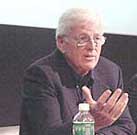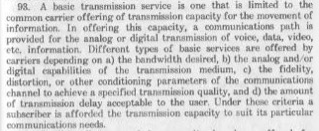Net neutrality
Net Neutrality and the 1980 2nd Computer Inquiry Decision
23 12, 10 10:02
On April 7, 1980 FCC adopted the Final Decision in the Second Computer Inquiry, Docket 20828. I recall that it was a 4.5 hour Commission meeting on only this topic, a far cry of Commission meetings of the past 2 decades. There was real public debate among the (then) 7 commissioners and the outcome was in doubt at times during that debate. In particular I remember that Comm. Tyrone Brown had court room experience and was very good in asking questions on the fly, being able to catch the staff in any logical inconsistency immediately. In the past 2 decades commissioners seem content asking questions prepared by their staff in advance on issues that have been settled in advance.
 Chmn. Ferris was a strong believer in the interdisciplinary approach to drafting policy and had strengthened the economic resources of the Office of Plans and policy (now OSP) and the Office of Science and Technology (now OET) and had them working closely with the Common Carrier Bureau (now WCB; CCB was then headed by Phil Verveer, now at DOS as US Coordinator for International Communications & Information Policy) on drafting the Final Decision which he anticipated would be one of the high points of his chairmanship. At the time the AT&T antirust suit was going on and Chmn. Ferris anticipated that the Final Decision could result in an alternative ending for this potentially destabilizing litigation. It was hoped that Congress would effectively “ratify” the decision with legislation and order a termination of the litigation. However, the ongoing Iran hostage crisis proved to be such a distraction that Congress never attended to this issue and finally the 1982 MFJ in the Reagan Administration resolved the litigation.
Chmn. Ferris was a strong believer in the interdisciplinary approach to drafting policy and had strengthened the economic resources of the Office of Plans and policy (now OSP) and the Office of Science and Technology (now OET) and had them working closely with the Common Carrier Bureau (now WCB; CCB was then headed by Phil Verveer, now at DOS as US Coordinator for International Communications & Information Policy) on drafting the Final Decision which he anticipated would be one of the high points of his chairmanship. At the time the AT&T antirust suit was going on and Chmn. Ferris anticipated that the Final Decision could result in an alternative ending for this potentially destabilizing litigation. It was hoped that Congress would effectively “ratify” the decision with legislation and order a termination of the litigation. However, the ongoing Iran hostage crisis proved to be such a distraction that Congress never attended to this issue and finally the 1982 MFJ in the Reagan Administration resolved the litigation.
Early in my FCC tenure I was assigned to work with Jim Smith of the Common Carrier Bureau (later with Ameritech, now with AT&T) on the “wordsmithing” of the final text of the decision dealing with the basic/enhanced dichotomy. Jim’s early draft on this issue began with the phrase, “with an air of finality we now decide...”. I pointed out that the 1st computer inquiry foundered because of technological change that had (and possibly could not) been anticipated, and that any definition would risk becoming anachronistic as technology evolved. We were certainly aware of what is now called internet because my boss, Steve Lukasik, was the person who authorized the development of this technology while director of ARPA (now DARPA) and had brought access to FCC when he arrived in 1979. I had been an ARPANET user since 1973 and was included in an early directory that has 2000 addresses for the whole world. So Jim and I worked to make the basic/enhanced definition technology neutral and capable of evolving with anticipated technology - knowing that unanticipated disruptive technology was also likely.
At the top of this post is the basic/enhanced discussion that Jim and I drafted as it was adopted by the Commission - it is linked to the decision’s text. It was an attempt to focus on basic concepts of communications and information theory. Personally, I think that today’s broadband would be a basic service subject to Title II regulation under this 1980 definition. The information I send from my computer is delivered to e-mail recipients and web hosting services in the form that I sent without valued added, computation, or explicit use of information storage. Verizon ships me bits from Netflix, it does not compress video or store it for my later access.
However, a lot of water has gone over the dam since April 1980 and today’s legal definition of the basic/enhanced dichotomy in our common law system is a function of:
In any case, it is certain that Congress and the courts will probably be very busy in the next year in reviewing the net neutrality decision and probably fine tuning it.

Early in my FCC tenure I was assigned to work with Jim Smith of the Common Carrier Bureau (later with Ameritech, now with AT&T) on the “wordsmithing” of the final text of the decision dealing with the basic/enhanced dichotomy. Jim’s early draft on this issue began with the phrase, “with an air of finality we now decide...”. I pointed out that the 1st computer inquiry foundered because of technological change that had (and possibly could not) been anticipated, and that any definition would risk becoming anachronistic as technology evolved. We were certainly aware of what is now called internet because my boss, Steve Lukasik, was the person who authorized the development of this technology while director of ARPA (now DARPA) and had brought access to FCC when he arrived in 1979. I had been an ARPANET user since 1973 and was included in an early directory that has 2000 addresses for the whole world. So Jim and I worked to make the basic/enhanced definition technology neutral and capable of evolving with anticipated technology - knowing that unanticipated disruptive technology was also likely.
At the top of this post is the basic/enhanced discussion that Jim and I drafted as it was adopted by the Commission - it is linked to the decision’s text. It was an attempt to focus on basic concepts of communications and information theory. Personally, I think that today’s broadband would be a basic service subject to Title II regulation under this 1980 definition. The information I send from my computer is delivered to e-mail recipients and web hosting services in the form that I sent without valued added, computation, or explicit use of information storage. Verizon ships me bits from Netflix, it does not compress video or store it for my later access.
However, a lot of water has gone over the dam since April 1980 and today’s legal definition of the basic/enhanced dichotomy in our common law system is a function of:
- accumulated legislation,
- FCC decisions, and
- court decisions.
In any case, it is certain that Congress and the courts will probably be very busy in the next year in reviewing the net neutrality decision and probably fine tuning it.
Comments




![Validate my RSS feed [Valid RSS]](valid-rss-rogers.png)

